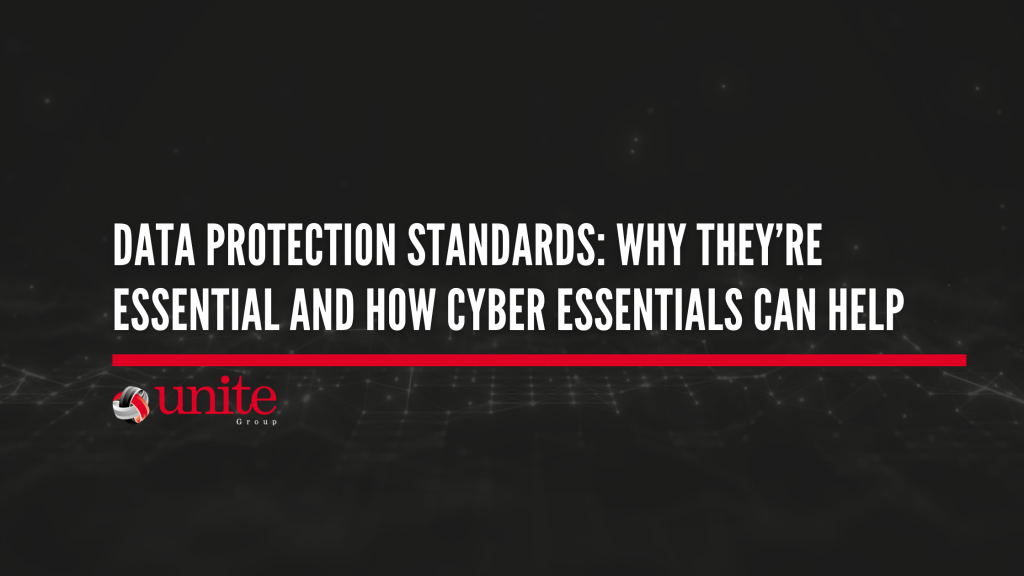
Cyber threats are becoming increasingly sophisticated, and organisations face growing pressure to adhere to stringent data protection standards. These standards not only help businesses safeguard critical information but also ensure compliance with legal and regulatory requirements.
At The Unite Group, we support businesses in meeting data protection standards through Cyber Essentials certification. This government-backed scheme provides a clear framework for securing your organisation against the most common cyber threats, helping you build a strong foundation for data security and compliance.
In this blog, we’ll explore the importance of data protection standards, the risks of non-compliance, and how Cyber Essentials can support your business in achieving robust cyber security.
What Are Data Protection Standards?
Data protection standards are guidelines and practices designed to ensure that sensitive information is handled securely and responsibly. These standards typically focus on protecting the confidentiality, integrity, and availability of data, covering areas such as access controls, encryption, and secure storage.
In the UK, businesses must comply with the General Data Protection Regulation (GDPR), which sets strict rules for how personal data is collected, processed, and stored. Adhering to data protection standards not only helps businesses avoid legal penalties but also builds trust with customers and stakeholders.
Why Are Data Protection Standards Important?
1. Protecting Sensitive Information
Data protection standards help safeguard sensitive information such as customer details, financial records, and intellectual property. By implementing these standards, businesses reduce the risk of data breaches and unauthorised access.
2. Ensuring Legal Compliance
Non-compliance with regulations like GDPR can result in hefty fines and reputational damage. Meeting data protection standards ensures that your organisation operates within the law and avoids costly penalties.
3. Building Customer Trust
Customers are more likely to engage with businesses that prioritise data security. Adhering to data protection standards demonstrates your commitment to safeguarding their information, fostering loyalty and trust.
4. Reducing Cyber Security Risks
By implementing robust data protection measures, businesses can mitigate the risk of cyberattacks, ensuring operational continuity and reducing potential downtime.
5. Supporting Business Growth
In many industries, compliance with data protection standards is a prerequisite for securing contracts and partnerships. Meeting these standards can open doors to new opportunities and markets.
The Risks of Non-Compliance
Failing to meet data protection standards can have serious consequences for businesses, including:
- Financial Penalties: Non-compliance with GDPR can result in fines of up to £20 million or 4% of annual global turnover, whichever is higher.
- Reputational Damage: Data breaches can erode customer trust, leading to lost business and long-term damage to your brand.
- Operational Disruption: Cyberattacks can cause significant downtime, impacting productivity and revenue.
- Legal Consequences: Businesses may face lawsuits or regulatory action for failing to protect sensitive data.
How Cyber Essentials Supports Data Protection Standards
Achieving a Cyber Essentials certification is a practical step toward meeting data protection standards. This certification helps businesses implement essential cyber security measures to protect against the most common threats.
1. Secure Configuration
Cyber Essentials ensures that your systems are configured securely, reducing vulnerabilities that could be exploited by attackers.
2. Firewalls and Internet Gateways
Firewalls act as a barrier between your internal network and potential external threats, helping to block unauthorised access.
3. Access Control
By implementing strict access controls, Cyber Essentials ensures that only authorised personnel can access sensitive data and systems.
4. Malware Protection
The certification includes measures to protect against malware, such as antivirus software and application whitelisting, safeguarding your systems from malicious attacks.
5. Patch Management
Regular updates and patches are critical for addressing vulnerabilities. Cyber Essentials ensures that your software and systems are always up to date.
Benefits of Cyber Essentials for Your Business
1. Simplified Compliance
Cyber Essentials provides a clear framework for meeting data protection standards, making it easier for businesses to comply with regulations like GDPR.
2. Enhanced Security
By addressing the most common cyber threats, Cyber Essentials strengthens your organisation’s overall security posture.
3. Increased Customer Confidence
Displaying the Cyber Essentials badge demonstrates your commitment to data protection, building trust with customers and partners.
4. Competitive Advantage
Many organisations now require their suppliers to have Cyber Essentials certification. Achieving this certification can help your business stand out and secure new opportunities.
5. Cost-Effective Protection
Cyber Essentials focuses on practical, affordable measures that deliver significant security benefits without requiring a large investment.
How The Unite Group Can Help
At The Unite Group, we understand the importance of data protection and cyber security for modern businesses. Our team provides expert guidance to help you achieve Cyber Essentials certification, ensuring your organisation meets data protection standards and stays secure.
Our services include:
- Initial Assessments: Identifying vulnerabilities and providing recommendations.
- Implementation Support: Helping you implement the necessary security measures.
- Certification Assistance: Guiding you through the certification process to ensure success.
Protect Your Data Today
In an era where data breaches and cyber threats are becoming increasingly common, adhering to data protection standards is not just a legal requirement—it’s a business necessity. Achieving Cyber Essentials certification is a proactive step toward safeguarding your organisation’s sensitive data, building customer trust, and ensuring compliance.
Contact The Unite Group today to learn more about how we can help your business achieve Cyber Essentials certification and strengthen its cyber security. Let’s work together to protect your data and secure your future.
